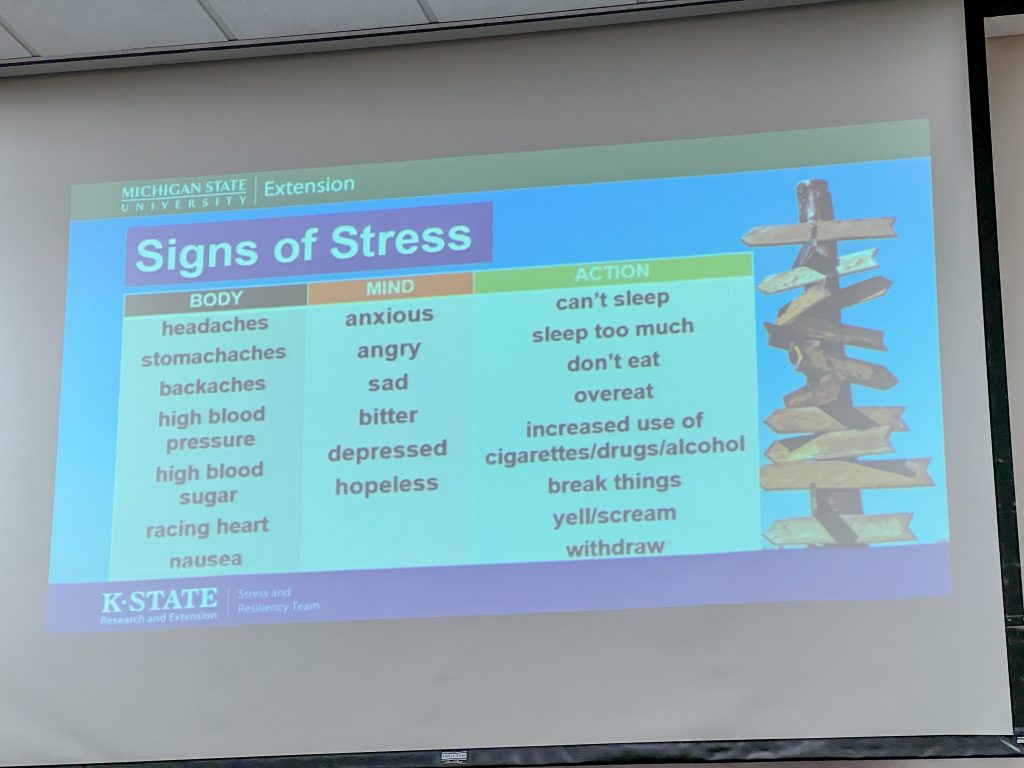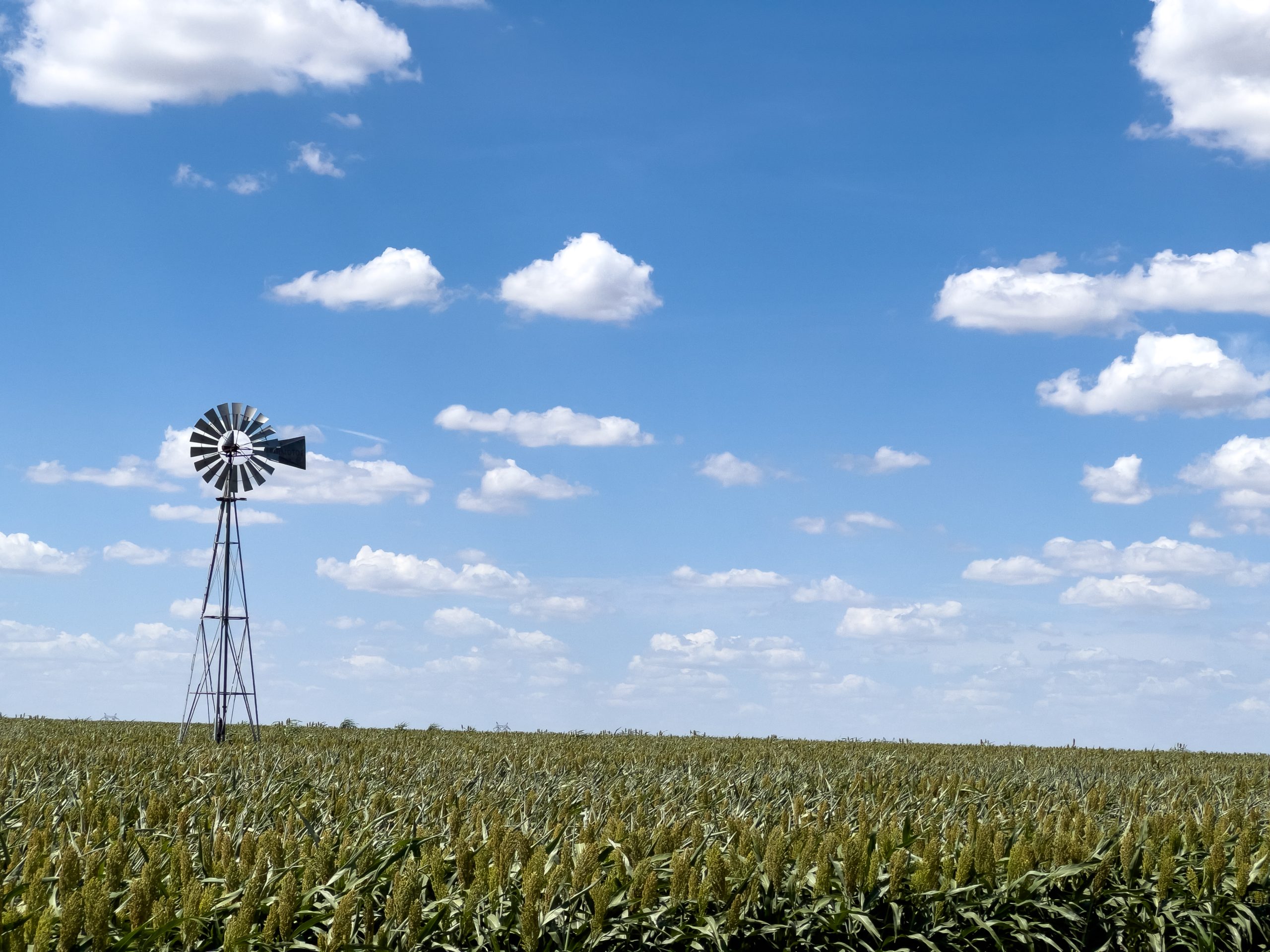An agricultural field day is often not the place to find tips on a positive mindset, however, the Southwest Research and Extension Center’s recent Field Day Plus gave attendees just that.
Sharon Erickson-Fryback, Gray County, Kansas, family and consumer sciences/4-H agent and Rachel Clews, SWREC Extension family and consumer sciences specialist, provided tips for agriculture producers during their segment at the event.
Both Fryback and Clews are involved in their family’s operations and grew up on farms, and understand the stress involved with agriculture.
Clews said when people think about stress they are often thinking about distress. For example, when cave men were being chased by a saber-toothed tiger, that was a stressful situation.
“So it brought on either this fight or flight or freeze stage. You either fought it won or lost, or you ran away from it, or sometimes people just get paralyzed with stress,” she said.
Good stress is also known as eustress. This kind of stress happens when someone is planning an event and it’s only going to be stressful for a short period of time.
Good stress that comes in small doses and can be good for people, but when it comes a chronic, long-term problem because of outside forces it then becomes distress. And that’s not good for people.
Some people suffer from headaches or upset stomachs when stressed, others carry tension in their back and neck. It can affect blood sugar, blood pressure, heart rate and many other things. Others might be edgy or bounce around, while some might be angry, bitter or just “really grumpy at everything.” Some might even start feeling sad or depressed and lose all sense of hope.

Some people may sleep too much hoping that “maybe it will all go away.” Others overeat and some don’t eat at all. Fryback said it just all depends on the person.
Strategies for dealing with stress in agriculture
Cortisol is a stress hormone that, in small doses, can be a good thing.
“It helps us do what we need to. Helps us move forward,” Clews said. “But when we have too much of that cortisol, it affects our body. It affects all parts of it.”
Immune function goes down, fertility is affected, and mood is influenced by cortisol.
On the farm there’s many tools in the toolbox to fix equipment or take care of animals. But farmers and ranchers also need to find a way to have tools to fix themselves.
The pair suggested things that work best for the individual. Meditation, exercise, eating healthy, a hot bath, going for a walk, and visualization were some of their suggestions.
“Find what works for you,” Fryback said. “The tool that works for you today may not work for you tomorrow but keep trying to find what works best for you.”
She suggested matching the strategy for stress relief with the activity. For example, if there’s a bunch of energy built up, go for a walk or run and release some of that.
“Find somebody you can talk to whether it be the preacher, whether it be the banker if you have some financial issues, find your extension agent to go through and brainstorm some strategies to help work through whatever’s going on on the farm,” Fryback said.
Clews suggested concentrating on self-talk.
“I like to tell people a lot of times if I treated my friends the way that I treat myself, I wouldn’t have any friends,” she said. “A lot of times we’re harder on ourselves than we are on anyone else. And so it’s amazing how that positive talk helps.”
Second, use your breath. Clews said there’s a difference between breathing to stay alive versus breathing to help calm yourself.
“Deep breathing can help clear your mind. It can help get rid of that brain fog. It can help with insomnia,” she said.
Self-acceptance is another strategy, and a big one. It goes back to treating friends like how you treat yourself, according to Clews. She said to think about the unique stressors for agricultural producers and families.
“Can you change the weather? Nope. Can you change government regulation or commodity prices?” she said. “I can change my attitude.”
Helping someone else
Clews said it is important to talk about death by suicide in agriculture communities. The numbers seem to be getting worse. Most Kansas counties are considered “rural or frontier” and in those populations, there was a 57% increase in suicide.
The pair suggested a couple of things if someone is contemplating suicide. Fryback said with her experience in mental health, it’s not easy to ask someone if they’re considering ending their life.
Asking them the question isn’t going to increase the chance of suicide, and it’s not going to plant the seed for someone.
“Their thoughts are probably already there,” Fryback said. “Actually, you asking the question may give the opportunity for someone to feel relief and to know that someone cares.”
Ask directly and with sincerity. Use no judgement as you don’t want to make them feel worse or wrong for their feelings.
“It’s important for you not to leave them alone,” she said.
Call for help or take them to a health care facility. Sheriff’s departments or local police departments may be the right choice too.
“They want that to be in a neutral location so that they can provide a safe opportunity not only for the person, but for the person that’s creating the assessment to help find the resources that are needed,” Fryback said.
For more information, visit the Kansas Suicide Prevention Resource Center at www.ksphq.org. The North Central Farm and Ranch Stress Assistance Center has information on their website as well at farmstress.org.
Kylene Scott can be reached at 620-227-1804 or [email protected].
A serious topic
By Kylene Scott
Sharon Erickson-Fryback, Gray County, Kansas family and consumer sciences/4-H agent and Rachel Clews, Southwest Research and Extension Center’s Extension specialist, family and consumer sciences agent, said unchecked stress can lead to a disastrous ending.
According to Fryback, agricultural producers face a lot of stressors, and she discussed some strategies on how to manage stress, resources to get help and more information regarding managing stress. The pair also talked about how to improve understanding and awareness, warning signs of suicide, how to access resources, or how to help someone in a critical mental health situation.
Clews said the western and central parts of Kansas have been hit especially hard by suicides, and as part of her job, she’s trained to help people realize those unique stressors in themselves and neighbors.
Stark numbers
“These are some scary facts in Kansas. One person dies by suicide every 16 hours, more than six times as many people died by suicide in 2019 than an alcohol related motor vehicle accident,” she said. “Overall, death by suicide is the ninth leading cause of death in Kansas.”
The rate of suicide has increased by 70% since 2000, and COVID really did a number on the mental health of many, she said.
“And also, in our agricultural community, we have farmers who already live in isolation. They’re on a tractor and a combine, out with the cattle,” she said.
Helpful information
As previously noted in other stories, people can call 9-8-8 for the Suicide and Crisis Lifeline, which was established July 16, 2022, and was co-authored by U.S. Sen. Jerry Moran, R-KS, as part of the National Suicide Hotline Designation Act.
The lifeline is a nationwide network of crisis centers linked through a 24/7 toll-free number that connects callers in crisis to immediate intervention services and care with trained counselors. It provides free and confidential support, prevention and crisis resources.




